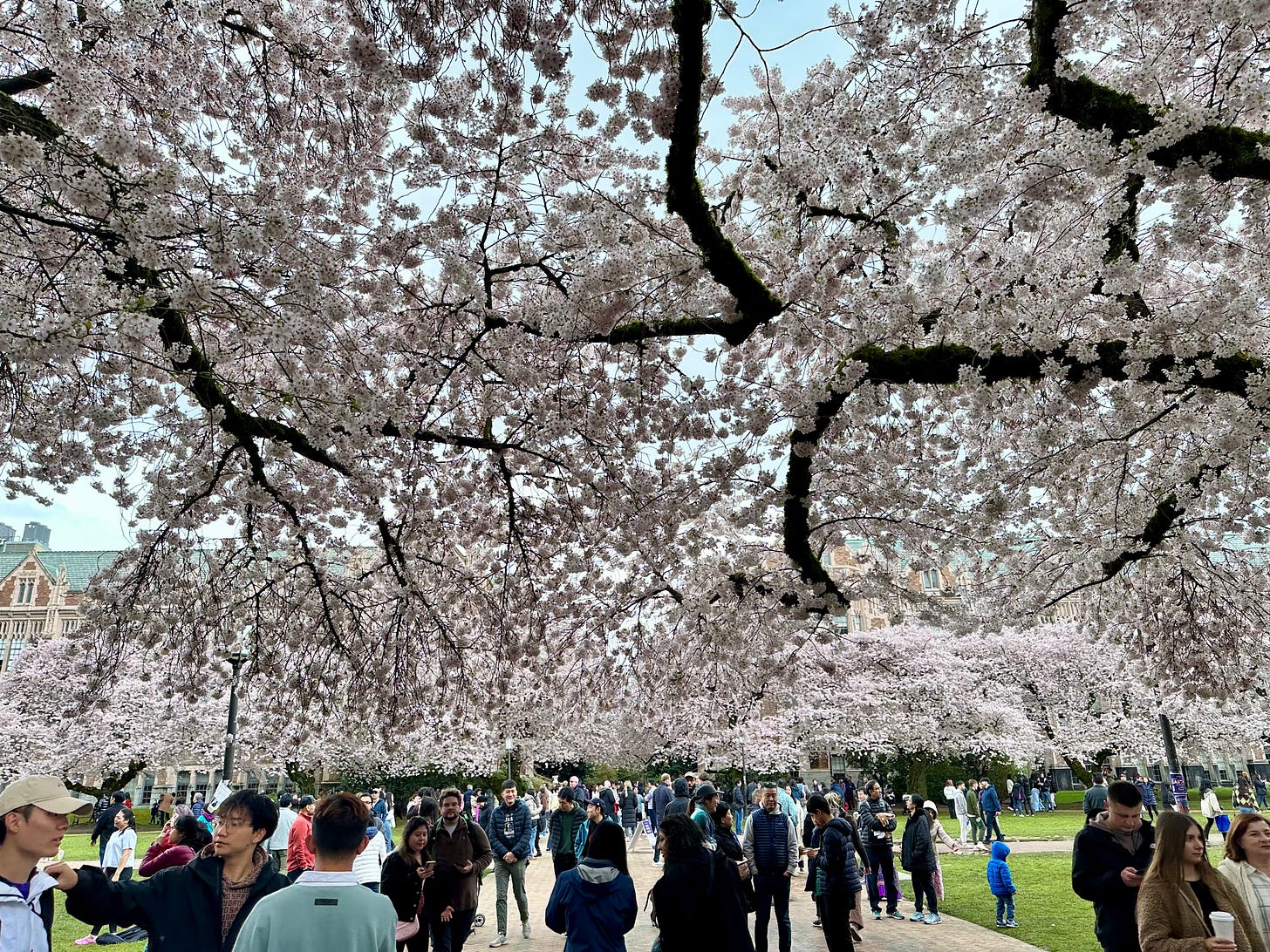In Bloom
cherry blossoms photo diary | an MCAS flare | and prioritizing
This newsletter has moved!
To receive new and infrequent musings, the latest fiction and non-fiction narratives, updates, and "life nuggets”, subscribe here.
It was peak bloom season for cherry blossom trees last week.
Brian tried to recruit the family to join him on the stunning University of Washington campus, where the Quad is essentially a cherry blossom showcase.
It’s an event to witness.
But, my brain still wasn’t quite back after flaring from consuming tomatoes, which have now made a reappearance on my “Can’t-Eat” list.
I knew the place would be packed. (Crowds and I aren’t copacetic.) Plus, since we were having friends over on Sunday and I was out of commission all week, chores piled up. So, I chose to stay behind and do what I could before the exhaustion took over and my brain no longer functioned.
As I told my therapist, I feel terrible about our situation sometimes. I’m an introvert who seems extroverted (my nervous chatter can be charming, apparently). I need a decent chunk of time to myself each week, which I haven’t had since pre-pandemic. Brian is an extrovert with severe social anxiety—he just wants to spend time with people he cares about.
We spend just about all of our time together. We exist in the same space all day: parallel-working at home, dining together, watching TV together, or actually hanging out and chatting.
We’re technically always “together,” but not always doing activities as a couple or as a family.
The pandemic seems to have sucked the desire to try new things out of our family. It required us to bring in laptops for each child to be able to participate in school with, and now screens are firmly where the kids’ interests are tethered to.
Thankfully, one kiddo, Little, decided to go with Brian to see the fully bloomed cherry blossoms on Saturday. She brought her iPad to capture her own photos (and to play with in transit), and they got a beautiful Daddy-Daughter afternoon together while the teenager and preteen did what they always do—lounge around the house, playing on their devices.
The brain fog started to alleviate a bit after reducing the one antihistamine a couple of weeks ago, while increasing the dosage of and spreading out another.
About two months ago, I decided to go through all my prescribed and self-added supplements and medications, doing some research on each. It’s an action I do at least once annually, but never got around to last year. My goal with checking is to see if there are any redundancies, if something may be causing side effects and I need to quit it or mention it to a doctor, or if there are any possible medication-supplement interactions happening.
I see several doctors and specialists, and I want to double-check that different doctors’ prescriptions aren’t interacting poorly.
During this check-in, I discovered that one of my medications which needs to be diluted in water is supposed to be taken 30 minutes before consuming any food, four times daily.
Prior, I’d always take it right before eating, using it to throw back and swallow the handful of pills and supplements that help me to eat food, in general; but with a little more food-choice flexibility than if I ate unassisted. The medications-plus-enzymes combos make it so that my mast cells are better controlled to avoid mast-cell overreactions.
With the discovery (or “written reminder” since I know my original immunologist told me to “take thirty minutes before eating”) I finally started taking the diluted medication properly. But, with it, I found myself occasionally forgetting to take the rest of my medications—each one working to curb the body’s mast cell overreactions for different systems: digestive, brain, heart, lungs, skin, et cetera.
I’d sometimes forget the non-liquid medications, since the change broke my three-year-old routine. Especially when I was trying to work through lunch or was dining out with people; but frequently if I was having alcohol—something that would make it so that I absolutely should not forget to take the meds, yet did anyway.
Before having a drink, I’d take a digestive enzyme and histamine-blocking enzyme capsules, but not the full array of meds that helped better breakdown the food that would come soon after/later.
My brain clocked that early throw-back-of-the-head-and-swallow as: The meds have been taken. Commence consuming.
Even with meds, I still have “minor” histamine-reaction symptoms to most all foods:
I get sniffly, my nose will itch, I may flush a little (or a lot), and I probably need to clear my throat several times for about an hour. But, with various high-histamine foods, those mild symptoms become an all-systems-explosion. Last week’s symptoms included:
Palpitating heartbeat, acid reflux, burning skin and eyes and ears and nose, moderate-to-severe tinnitus, flushing and hives, itchiness, stomach cramps, bloating, gas, severe joint pain, swelling in my face and hands and feet and ankles. And, when whatever I consumed was high in histamines, histamine-triggering or -liberating, it becomes difficult to breathe, or I experience shortness of breath. And some triggers, when continually consumed or exposed to, can cause anaphylaxis.
Later symptoms—within anywhere from one to four hours after—always include brain fog with difficulty concentrating, and confusion. And with prolonged inflammation, my vision will blur, and my short-term memory vanishes.
I really pushed my luck on that thoughtless day, playing Russian Roulette with a nightshade fruit….
I added tomatoes to my salad for lunch, not thinking. I love tomatoes, until I was reminded how much my body hates them. And I kid you not, I don’t remember what tomato-based dinner we had that night—the meal that caused this severe fog and the above-listed bodily reactions.
But, to make things a hundred times worse, I forgot to take my medications before eating that system-thwarting dinner. (Definitely why I forgot what we ate.)
I realized about five or six hours later, after taking my nighttime pills out of the four-times-daily pill dispenser, when the dispenser still rattled with the sound of a full compartment of meds. Upon quick inspection, I saw “DIN” was still full.
Then, it was like all the symptoms I was already fighting but unable to fully recognize became crystal-clear and present.
“Fuck,” I said, quickly throwing back that second round of pills, even though I knew it was too late.
I was just starting to feel better, dammit!
Mistakes happen. But I hope I eventually learn my lessons before further increasing my risk of a stroke or developing a heart condition.1 2
Things are turning back around, though.
I’m being hyper-conscious of what I eat again, bringing back The 4-Phase Histamine Reset book to review the food lists and give myself some fallback recipes.
I already struggle with “kitchen paralysis”—an executive functioning issue which can make it difficult to plan and organize cooking tasks; also accounting for sensory sensitivities around handling food, plus the smell-factor; motor difficulties; and even communication challenges play a role for Autistic people.3
That paralysis is catapulted to the max while I’m in a flare. But, sometimes my food choices—the one flare-factor I can control—are the only way to get out of a flare. Therefore, I have to make bold decisions on how to conserve energy in other ways. So, I resigned myself from projects for a time, and I’m focusing on getting back to baseline.
I’ll write when I can write, but my health needs to come first.
On Sunday, we had a blast with our friends. The preteens hung out in the bedroom while the younger set of kids played on Little’s devices together at the kids’ computer desk (which Little has co-opted) in the living room where the adults chatted.
The husband-father-friend is also neurodivergent, and he shared something profound that I wish I had considered when writing about the Seattle Freeze before—the phenomenon that Seattleites are cold and unfriendly, and that it’s difficult to make friends in the city; especially as a transplant.
I didn’t find that to be the case, personally. I found the transient nature of the city to be my pain-point in local friendships.
He said (paraphrased), “The Seattle Freeze is really just people respecting other people’s boundaries; not forcing small talk and conversations to strong-arm-fulfill a personal need that may not be satisfying, or may be uncomfortable for the other party. If someone doesn’t want to make eye contact, they’re not judged and their boundaries are respected. If someone would rather not talk, they’re not judged and their boundaries are respected. More regions might be better served if they practiced the same form of social respect.”
As a high-masking, trying-to-stop-people-pleasing Autistic woman, that deeply resonated with me.
As much as I wanted to spend the day with Brian, checking out the cherry blossoms and finally visiting the gorgeous UW campus, I’m proud of myself for opting out. I needed to recalibrate myself after being down with a flare with residual brain fog from the medication mess-up still, too. I needed to get the house in order to re-center myself.
And, if I hadn’t stayed home, we wouldn’t have gotten a (free!) brand-new washing machine. I mean, I didn’t put away the kids’ clothes like I told myself I would, but at least they’re clean!
Although the need for alone-time goes unfulfilled, other needs have been satiated. I’m beginning to feel whole again. My time feels more valuable and well-utilized.
I’m focused on no longer forcing things—myself, included.
I can do something, or I can’t. Feeling shame and guilt over taking care of myself is ridiculous. “Missing out” is person-to-person and situation-to-situation.
Brian said the photos don’t do them justice, but I was grateful for the real-time updates he sent.
Next year, I’ll go see the cherry blossoms in person. Brian and I will get that quality time together that I love dearly and that he needs to feel connected to people. (Of course, I’ll spend quality time with him before next year’s blooms, but you get me.)
We’ve got time.
And we’ve always got each other.
My best,
Sara
subscribe to | my free, sporadic newsletter
get the | Content Strategy Planner
support my work and | “buy me a coffee”
visit the website | segwrites.com
P.S. I predominantly write from my personal experience as an Autistic person with ADHD, chronic illness, Anxiety, and more. Each of these factors can influence my individual experience overall, as well as my experience of each condition.
What I share is not a substitute for medical advice.
Self-identification of Autism (what many call “self-diagnosis”) is perfectly valid. If a personal Autistic experience I write about resonates deeply with you, consider these resources on Embrace Autism (starting with the Autism Quotient Test) as a first step. If professional assessment is important to you or your life has been impeded enough that you may need to qualify for Disability, you can print your results to bring to a diagnostician. (Having all those tests completed in advance saved me a lot of money!) Although there are many more diagnosticians available, here is a comprehensive list to get you started.
Lastly, some of my opinions may have changed since I first wrote the piece that lead you here.
Comment with any questions, and I’ll respond as soon as I can.
Stress triggers coronary mast cells leading to cardiac events, PubMed Central








